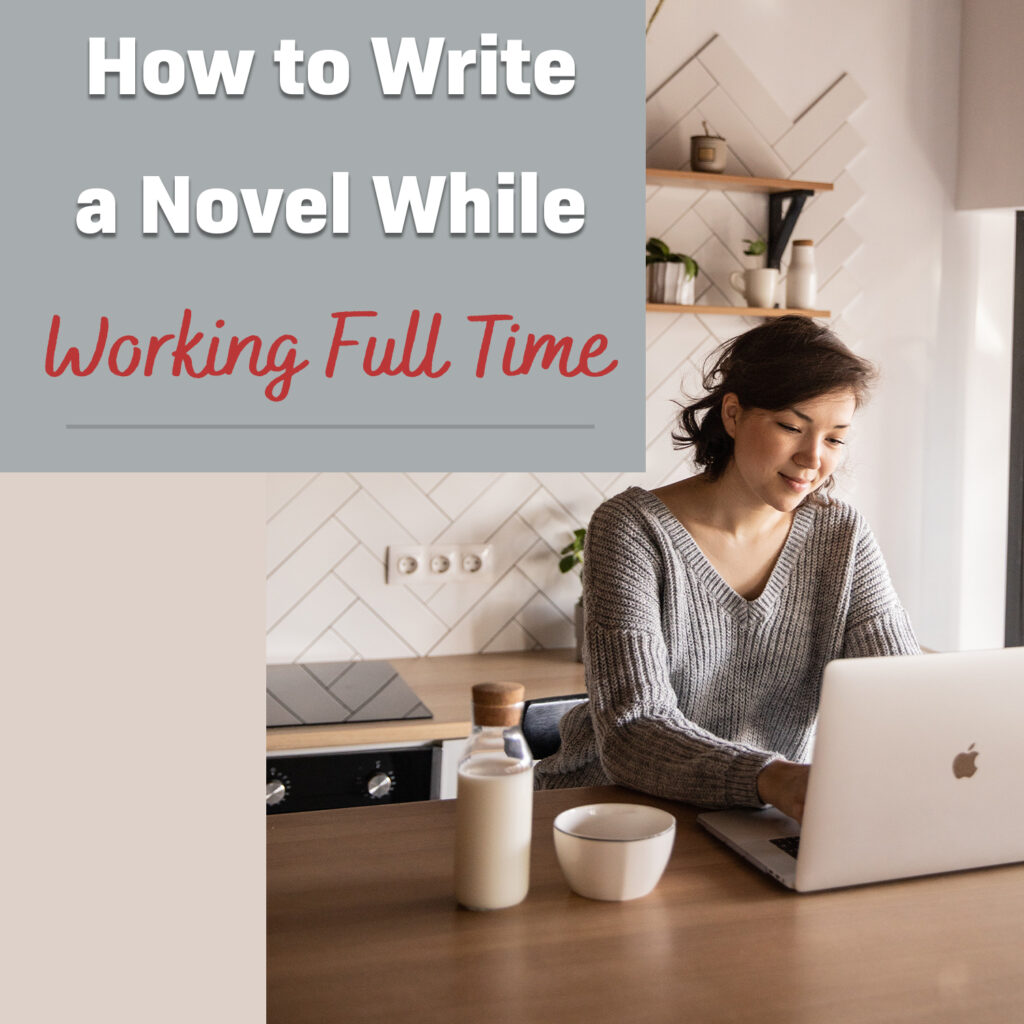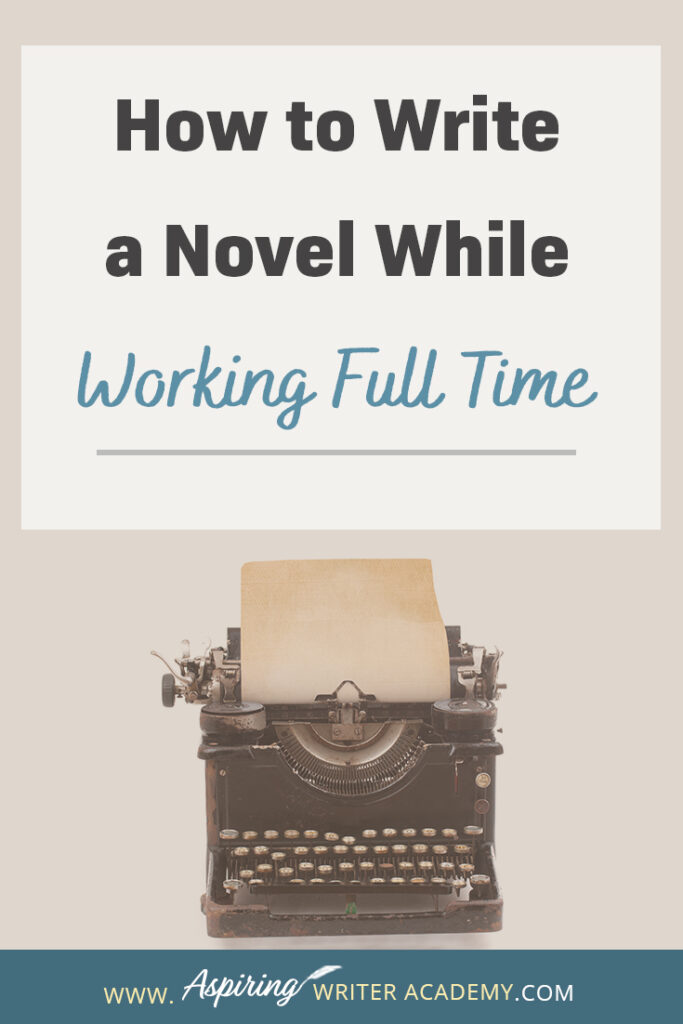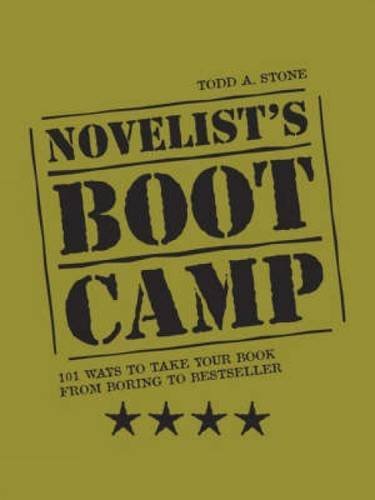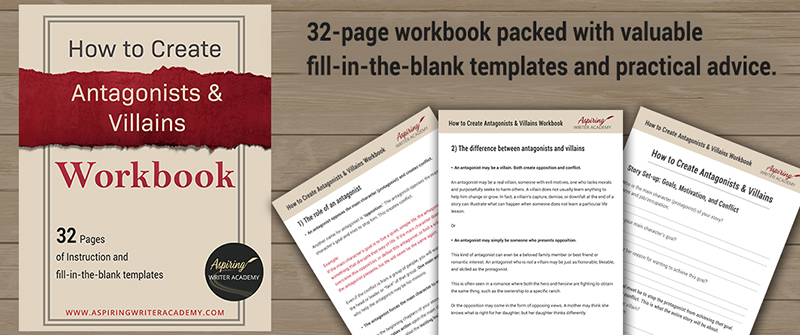How to Write a Novel While Working Full Time

Writing a novel while working full time or raising small children or caring for aging parents is no small feat. So how do you do it? How do you find time to write when your schedule is already filled? How do you make forward progress without feeling overwhelmed?
In our post, How to Write a Novel While Working Full Time, we give valuable tips and resources to help you balance your work schedule with your writing so you can finally finish that coveted manuscript.
 I have always loved creating stories and always knew I wanted to be a writer. While attending college I chose short story and creative writing classes, and even one on children’s literature. I suppose I always imagined that I would work as an editor at a publishing house and branch out into publishing my own books from there.
I have always loved creating stories and always knew I wanted to be a writer. While attending college I chose short story and creative writing classes, and even one on children’s literature. I suppose I always imagined that I would work as an editor at a publishing house and branch out into publishing my own books from there.
However, life doesn’t always work out as planned, and instead, I soon I found myself married, moving across the country, and raising three wonderful children. Writing became a luxury that I looked forward to during the children’s nap time.
When the children got older and I went back to work to help supplement our family income, my writing schedule had to change once again. Sometimes, after putting in a long day, I would sigh and wonder—how on earth I would ever finish my book and pursue that long sought-after writing career?
Through trial and error, I learned some valuable tips that not only allowed me to finish one book, but over a dozen, many of them winning prestigious recognition and awards. In the post below, I would like to share the methods and resources that helped me most, so that you too can make significant progress on your writing while still working a full-time job.
In the post below we will discuss:
- Tips to Buy Time When You Are Short on Cash.
- Scheduling to Balance Your Work with Writing.
- Resources that Give You a Game Plan to Get Ahead.
1) Tips to Buy Time When You Are Short on Cash
- Barter or trade with others.
If you have children, see if you can watch other parents’ children for a few hours if they will watch yours for a few hours to give you time to write.
Or if chores are getting in your way, see if you can take on extra chores one week, if your family members will take on your chores the next week, creating a solid block of time for you to write.
If you live alone, you can barter with yourself. If you prepare a double batch of meals one week, and stick them in the freezer, then the following week you can pull them out, place them in the oven, and instead of spending time preparing food, you can sit down and write.
- Cut expenses in one area to provide funds for something else.
If you regularly buy a coffee or lunch out each workday, or routinely buy fast food, take out, or even fancy dinners out, consider cutting down this expense by bringing your own coffee or brown bag lunch to work.
Try eating dinners at home more often. Not only will this be better for your health (which also affects your mindset), but you will save money.
Or perhaps you can cancel a paid subscription that you do not really need. Or maybe there is something else in your life that you pay for but can cut from your budget?
Then, use that saved money to pay someone else to mow the lawn, or to clean your house, or to pay to have your groceries delivered, all saving you valuable time that you could use to write your novel.
You may also want to use the saved money to pay a babysitter for a few hours. Or you may want to use the money to do something fun with your family after they respect your writing time for a few hours each weekend.
2) Scheduling to Balance Your Work with Writing
Balancing work and other life obligations with your writing is tricky because your life may be quite different from another author’s. How you schedule your time is up to you. What works for some, may not work for others. However, here is a list of possible solutions for you to consider:
- Get up an hour earlier, before work, to get some writing time in.
Special Tip: Even if you are not a morning person, if you ask yourself, “how bad do I want it?” each time that dreaded alarm goes off and you are motivated enough, you can get up, write for 5 minutes in a journal about how much you hate getting up early but why you should do it anyway, then get right into working on your manuscript. This method works wonders.
- Stay up at least an hour later at night to get some writing time in.
Especially when the children are in bed and the phones are quiet. It’s amazing how much you can accomplish when you are not being interrupted. You may think you are too tired, but if you just give it a shot for a few minutes and get in ‘the zone,’ all of the sudden you might find your tiredness goes away.
- Carry your working manuscript to work in a briefcase or file folder and see if you can brainstorm, research, sketch dialogue, or draft scenes during your lunch break.
If you brown bag lunch instead of taking the time to go to a restaurant, you may end up with even more time. What short writing to-do tasks can you get done in this short amount of time? Save all your short tasks for lunch breaks. Even if you only write one paragraph each day, at the end of a week you will be that much farther ahead. (J.K. Rowling sketched ideas to write her Harry Potter series on a bus.)
- Create a block of time each Saturday and Sunday to work on your manuscript.
As we discussed earlier, you may want to write a few hours each weekend morning and then plan to do something fun with the family the rest of the day.
Or you may want to try to trade/barter time with others to create blocks of time that you didn’t have before. Perhaps writing in the afternoons or evenings are better for you.
The key is to make a plan and put it on the schedule. Write it into your calendar – make an appointment with yourself to write.
You may also find that you do not have the luxury to write in several hour chunks. Ever. That doesn’t mean you should wait until you do. Every spare moment matters.
It is quite possible to write a novel one small bite at a time. Put together a game plan of what you will work on each tiny session. At the end of the year, you could have a finished manuscript!
3) Resources that Give You a Game Plan to Get Ahead
While you may want to sit down and sketch out your very own customized game plan detailing the steps you will take to write your novel, there are also some very handy resources available that have step-by-step game plans already written out for you.
- One of the very best that I have found to guide me as I’ve written book after book is Book in a Month by Victoria Lynn Schmidt.
Do I ever write a book in a month? No.
But what I do is use all the included handy worksheets and templates and work on the bite-sized daily tasks one by one in order, even if it takes six months to a year to complete. The assignments for each day are very short, perfect for lunch breaks, and the questions asked really help you think about your characters and brainstorm your story. This book is also perfect to help authors create a preliminary outline.
Shop on Amazon: https://amzn.to/3yeTpIs
- Another book I have personally used is The Weekend Novelist by Robert J. Ray.
This book is set up with the assumption that if you are working full time, you can use your weekends to write a book. Again, each weekend is laid out with step-by-step assignments that you can complete. But if you cannot finish everything each weekend, just use it as a guide. The key is to keep moving forward, even if it takes you two or three weekends to finish one of the book’s ‘weekend’ assignments.
- You may also like Robert J. Ray’s other book which he wrote with Jack Remick:
- Another step-by-step guide I have found to be quite fun is: Novelist's Boot Camp: 101 Ways to Take Your Book From Boring to Bestseller by Todd A. Stone. Again, each assignment is very short, and the drills and language used are very motivational with their ‘get to it soldier’ attitude. Bit by bit, you will be pumping out pages in no time!
Shop on Amazon: https://amzn.to/3ITx3B8
I am certain that there are many other step-by-step books that you can use as a guide on the market but these are the books that I have personally used and can happily endorse. Find whatever method works for you and keep writing even if it is one sentence at a time!
We hope you have enjoyed reading How to Write a Novel While Working Full Time, and that you have learned some valuable tips to balance your time between your work schedule and your writing schedule.
If you have any questions or would like to leave a comment below, we would love to hear from you!
And if you would like additional help developing your story idea, we invite you to download our Free Brainstorming Your Story Idea Worksheet.
Do you find it difficult to create compelling antagonists and villains for your stories? Do your villains feel cartoonish and unbelievable? Do they lack motivation or a specific game plan? Discover the secrets to crafting villains that will stick with your readers long after they finish your story, with our How to Create Antagonists & Villains Workbook.
This 32-page instructional workbook is packed with valuable fill-in-the-blank templates and practical advice to help you create memorable and effective antagonists and villains. Whether you're a seasoned writer or just starting out, this workbook will take your writing to the next level.
Our Goal for Aspiring Writer Academy is to help people learn how to write quality fiction, teach them to publish and promote their work, and to give them the necessary tools to pursue a writing career.
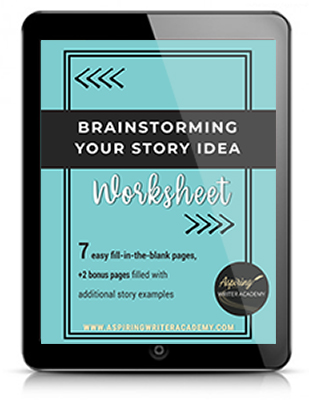
ENTER YOUR EMAIL BELOW
TO GET YOUR FREE
"Brainstorming Your Story Idea Worksheet"
7 easy fill-in-the-blank pages,
+ 2 bonus pages filled with additional story examples.
A valuable tool to develop story plots again and again.
Other Blog Posts You May Like
Scene & Sequel: The Secret to Plotting an Epic Novel
Scene & Sequel: The Secret to Plotting an Epic Novel (Part 2)
Writing Fiction: How to Develop Your Story Premise
12 Quick Tips to Write Dazzling Dialogue
10 Questions to Ask When Creating Characters for Your Story
Macro Edits: Looking at Your Story as a Whole
Basic Story Structure: How to Plot in 6 Steps
Writing Fiction: How To Keep Track of Time in Your Story
Behind the Scenes: Interview with the Authors of the “Sew in Love” Collection

is a multi-published author, speaker, and writing coach. She writes sweet contemporary, inspirational, and historical romance and loves teaching aspiring writers how to write quality fiction. Read her inspiring story of how she published her first book and launched a successful writing career.



